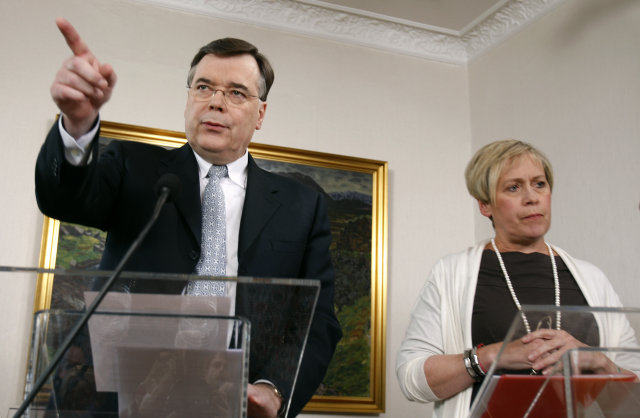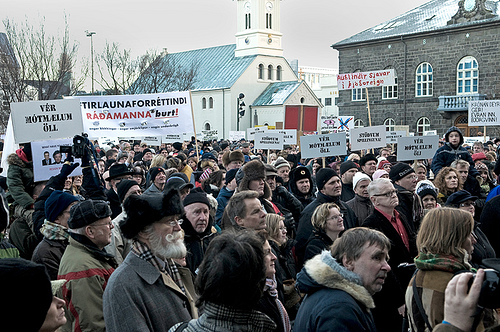
Icelandic Prime Minister Geir Haarde, leader of the Independence Party, announced at a press conference today that he was stepping down for health reasons and called for parliamentary elections on May 9th. Foreign Minister Ingibjorg Solrun Gisladottir, leader of the Social Democratic Alliance, which formed the other faction in the ruling coalition government, also stated that she favored spring elections.
 Icelandic Prime Minister Geir Haarde and Foreign Minister Ingibjorg Solrun Gisladottir. Photo credit: mbl.is/golli
Icelandic Prime Minister Geir Haarde and Foreign Minister Ingibjorg Solrun Gisladottir. Photo credit: mbl.is/golli
This reversal of policy follows weeks of steadily escalating protests, capped by this week's violent clashes between protesters and riot police before the Althingi, Iceland's historic parliament. It also comes two days after the Social Democratic Alliance's Reykjavik chapter endorsed the protesters' calls for new elections, and one day before the Independence Party's scheduled meeting, which has been postponed until March.
Iceland's spectacular rise in prosperity came to a crashing halt three months ago, when the government was forced to take over its three major banks after credit on the international market dried up. The British government invoked anti-terrorist legislation to seize one bank's British operations, the Icelandic krona dropped more than 70%, and the Icelandic stock market lost over 80% of its value in less than a week. Massive layoffs have followed, and the International Monetary Fund (IMF) has been called in.
However, no one in the ruling political or financial elite has assumed responsibility for the crisis, and David Oddsson, the former Prime Minister who oversaw the privatization of the banks and who currently serves as governor of the Central Bank, has refused to step down or admit any fault. Rumors of widespread malfeasance at the banks in the weeks preceding the crash abound.
A poll this week indicated that there has been a strong shift away from the ruling coalition in favor of the Left Green Party and the Progressive Party, but a substantial percentage of Icelanders want a new government with no ties with any of the existing political parties.
Before we can make informed decisions in the upcoming elections, we need to know:
•What the banking regulators knew, and when they knew it•Any monetary gifts given to the politicians and government bureaucrats by the banks and large companies•The family ties between the elected officials, the banks, and the companies•All suspicious loans, withdrawals, or transfers in the weeks preceding October 8, 2008 (the date that the first of the failed banks was nationalized)•Why Landsbanki didn't have its IceSave accounts in England transformed into a UK subsidiary as the British government had requested (which made the Icelandic, rather than the British government, responsible for their losses and which led to the British government's invocation of anti-terrorist laws to shut down Landsbanki's UK operations)•Whether the banks' assets were sold at a reasonable price and, if not, who made the decision to go ahead with the sales
The Icelandic media is largely owned and controlled by the same individuals suspected of participating in the widespread wrongdoing that led to our economy's collapse. We must ensure that this information reaches the public in a timely manner.
Unfortunately, the government and the banks have not taken any significant steps to investigate these matters, of if they have, they've done a very thorough job of keeping the information away from the public. The government last week appointed the sheriff from a rural town of 6,000 to investigate what is certainly a highly complex international financial scheme. Luxembourg bank secrecy law supposedly hinders government investigative committees' access to certain bank transactions that could reveal illegal money transfers, even though the government has nationalized the banks, and now owns and operates them. (Once the government assumed control of the bank, it stepped into the shoes of the bank officials, and is entitled, as the bank's owner and operator, to examine all customer accounts and to investigate any possible wrongdoing by its current and past employees.) Two weeks ago the government downsized the police's Economic Crimes Department.
Public sentiment against the Vietnam War in American began to shift when Daniel Ellsberg leaked the Pentagon Papers, and against Richard Nixon when Mark Felt leaked information to Woodward and Bernstein. Perhaps our own "Deep Throat" will come forward soon with the information we need, but I'm dubious.
Unless such a courageous soul steps forth, Icelandic voters can only assume that every elected official from either of the ruling parties was a participant in this massive fraud. The members of the opposition parties should have to explain why they didn't investigate the banking system despite all the warning signs over the past couple of years.
Any party seeking election must tell in detail the steps it would take to alleviate Iceland's suffering, how it would investigate and prosecute the crimes that led to the collapse, and the steps it would take to ensure the independence of our politicians and regulators in the future.
No one ever said democracy was easy, but we never imagined it would be so hard. Our only hope now is a peaceful transition from a corrupt plutocracy to the responsible liberal democracy we had fooled ourselves into believing we already had.
Although the odds are stacked against us, our recent uprising gives me hope that we will take our country back from this very small group of megalomaniacs, and that Icelanders' sense of justice and community will ultimately triumph over the greed that has characterized our politics for so long.
 Protesters in downtown Reykjavik. Photo credit: Johannes G. Skulason
Protesters in downtown Reykjavik. Photo credit: Johannes G. Skulason
Read more on this subject:Iceland - the Nordic Zimbabwe"Crime Once Exposed has no Refuge but in Audacity"Iceland is BurningIceland is Burning - Day 2
